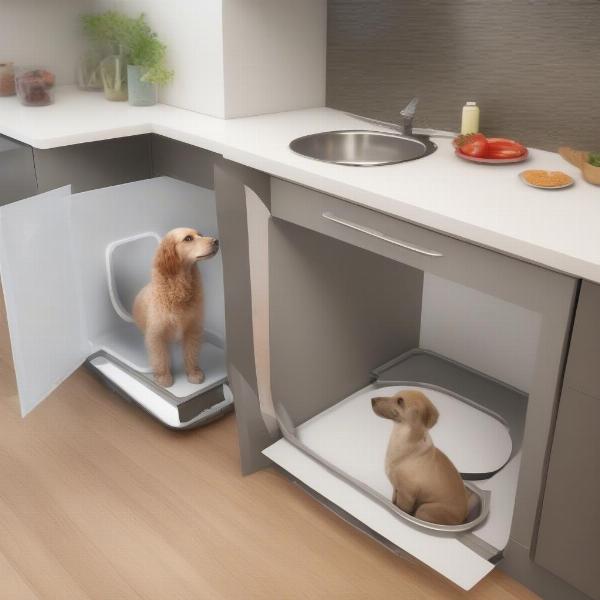A balanced diet is crucial for the health and happiness of both dogs and parrots. While their nutritional needs are vastly different, understanding these differences is key to ensuring a safe and thriving environment for both pets. This article explores the important considerations when managing a household with both a dog and a parrot, focusing on preventing dietary cross-contamination and ensuring each pet receives the appropriate nutrition.
Can Dogs and Parrots Share Food? A Definitive No!
While it might be tempting to let your dog finish off some leftover parrot food, or vice-versa, it’s absolutely crucial to understand that their dietary requirements are completely different. What’s healthy for one can be toxic to the other. Sharing food can lead to serious health problems, even death.
The Dangers of Dogs Eating Parrot Food
Parrot food often contains fruits, seeds, and nuts, some of which are toxic to dogs. For instance, avocados, grapes, and macadamia nuts are common ingredients in parrot diets that can cause severe digestive issues or even organ damage in dogs. Additionally, the high fat content in some parrot seed mixes can lead to pancreatitis in dogs.
The Risks of Parrots Eating Dog Food
Dog food is formulated for canine nutritional needs and lacks the essential vitamins and minerals required by parrots. The high protein and fat content in dog food can also be harmful to a parrot’s liver and kidneys. Furthermore, dog food often contains ingredients like onions and garlic, which are toxic to birds.
Creating Safe and Separate Feeding Areas
Preventing dietary cross-contamination starts with establishing designated feeding areas for your dog and parrot. Keep their food and water bowls in separate locations, and always supervise feeding times to ensure neither pet accesses the other’s food.
 Separate feeding areas for a dog and a parrot
Separate feeding areas for a dog and a parrot
Tips for Maintaining Feeding Hygiene
- Wash your hands thoroughly after handling either pet’s food.
- Clean food and water bowls daily to prevent bacterial growth.
- Store pet food in airtight containers in a cool, dry place.
- Sweep or vacuum regularly around feeding areas to remove any spilled food.
Choosing the Right Diet for Your Dog
A balanced canine diet should consist of high-quality dog food that meets their specific needs based on age, breed, and activity level. Consult with your veterinarian to determine the best food for your dog.
Key Nutrients for Dogs
- Protein: Essential for muscle development and repair.
- Fats: Provide energy and support healthy skin and coat.
- Carbohydrates: Provide energy and fiber for digestion.
- Vitamins and Minerals: Essential for overall health and function.
Choosing the Right Diet for Your Parrot
Parrots require a specialized diet that includes a variety of fresh fruits, vegetables, and high-quality parrot pellets. Consult with an avian veterinarian to determine the appropriate diet for your parrot’s species.
Key Nutrients for Parrots
- Vitamins A, D3, and E: Crucial for bone health, immune function, and feather quality.
- Calcium and Phosphorus: Essential for strong bones and beak health.
- Protein: Necessary for muscle development and feather growth.
- Fiber: Aids digestion and promotes gut health.
Conclusion: A Healthy Home for Both Dog and Parrot
By understanding the distinct dietary needs of dogs and parrots and implementing safe feeding practices, you can create a harmonious and healthy environment for both your beloved pets. Remember, separate diets are crucial for preventing health issues and ensuring both your dog and parrot thrive.
FAQs
- Can my dog have a little bit of parrot food as a treat? No, even small amounts of certain parrot foods can be toxic to dogs.
- Is it okay if my parrot nibbles on a piece of dry dog food? No, dog food lacks the essential nutrients parrots need and can be harmful.
- What should I do if my dog accidentally eats some parrot food? Contact your veterinarian immediately.
- Can I feed my dog and parrot in the same room? Yes, as long as their feeding areas are clearly separated and supervised.
- Where can I find more information about parrot nutrition? Consult with an avian veterinarian.
- What should I do if my parrot refuses to eat its pellets? Consult with an avian veterinarian to rule out any underlying health issues and explore alternative feeding strategies.
- Can I prepare homemade food for my parrot? Yes, but it is crucial to consult with an avian veterinarian to ensure the diet is nutritionally complete.
ILM Dog is your global resource for expert dog care and nurturing advice. We offer practical guidance on all aspects of dog ownership, from breed selection and health care to training, nutrition, and product recommendations. For tailored advice based on your dog’s specific needs, connect with our expert team at [email protected] or call us at +44 20-3965-8624. ILM Dog is dedicated to helping you provide the best possible care for your canine companion.